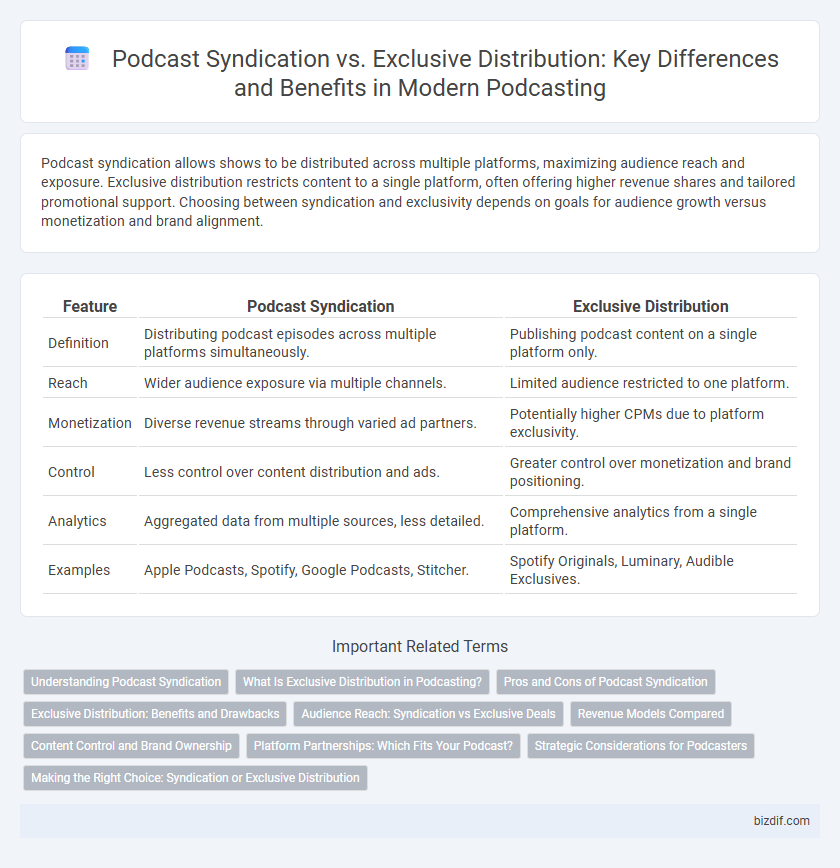Podcast syndication allows shows to be distributed across multiple platforms, maximizing audience reach and exposure. Exclusive distribution restricts content to a single platform, often offering higher revenue shares and tailored promotional support. Choosing between syndication and exclusivity depends on goals for audience growth versus monetization and brand alignment.
Table of Comparison
| Feature | Podcast Syndication | Exclusive Distribution |
|---|---|---|
| Definition | Distributing podcast episodes across multiple platforms simultaneously. | Publishing podcast content on a single platform only. |
| Reach | Wider audience exposure via multiple channels. | Limited audience restricted to one platform. |
| Monetization | Diverse revenue streams through varied ad partners. | Potentially higher CPMs due to platform exclusivity. |
| Control | Less control over content distribution and ads. | Greater control over monetization and brand positioning. |
| Analytics | Aggregated data from multiple sources, less detailed. | Comprehensive analytics from a single platform. |
| Examples | Apple Podcasts, Spotify, Google Podcasts, Stitcher. | Spotify Originals, Luminary, Audible Exclusives. |
Understanding Podcast Syndication
Podcast syndication enables creators to distribute content across multiple platforms and apps, increasing reach and audience engagement without platform restrictions. This approach leverages RSS feeds to automatically update episodes on various directories, maximizing visibility while maintaining ownership of content. Exclusive distribution limits podcasts to a single platform, often trading broader accessibility for platform-specific monetization opportunities.
What Is Exclusive Distribution in Podcasting?
Exclusive distribution in podcasting refers to the practice where a podcast is made available solely on one platform or service, restricting its availability on other outlets. This model helps content creators secure dedicated revenue streams, enhanced marketing support, and unique audience insights from the exclusive platform. While it limits the podcast's reach to a single distribution channel, exclusive deals often provide financial stability and brand alignment for podcasters.
Pros and Cons of Podcast Syndication
Podcast syndication allows content creators to distribute their episodes across multiple platforms, increasing reach and audience diversity without platform restrictions. This method enhances discoverability and potential monetization opportunities through broader distribution but often means less control over branding and listener data. However, the lack of exclusivity may dilute revenue streams compared to exclusive distribution deals that offer higher rates and targeted audience engagement.
Exclusive Distribution: Benefits and Drawbacks
Exclusive distribution in podcasting grants creators full control over their content, often resulting in higher revenue through direct monetization deals with platforms like Spotify or Apple Podcasts. This approach enhances brand loyalty by offering unique content only available on a specific platform but limits audience reach compared to syndication. Potential drawbacks include reduced discoverability and dependency on a single platform's algorithms, which may affect long-term growth and exposure.
Audience Reach: Syndication vs Exclusive Deals
Podcast syndication maximizes audience reach by distributing episodes across multiple platforms, increasing discoverability and listener diversity. Exclusive distribution limits availability to a single platform, potentially narrowing the audience but enhancing brand loyalty and platform-specific engagement. Choosing between syndication and exclusive deals depends on whether the priority is broad exposure or targeted, high-value listener engagement.
Revenue Models Compared
Podcast syndication allows creators to distribute episodes across multiple platforms, increasing audience reach and enabling diverse revenue streams such as ad impressions, sponsorships, and affiliate marketing. Exclusive distribution often involves direct partnerships with a single platform, which offers higher upfront payments or revenue shares but limits exposure to one ecosystem. Comparing revenue models, syndication leverages volume and multi-channel monetization, while exclusivity relies on premium deals and controlled brand alignment.
Content Control and Brand Ownership
Podcast syndication allows creators to distribute content across multiple platforms, increasing reach while sharing control with third-party services. Exclusive distribution grants podcasters full content control and brand ownership by limiting availability to a single platform, enhancing brand consistency and monetization opportunities. Choosing between syndication and exclusivity depends on balancing audience growth with maintaining autonomy over podcast assets.
Platform Partnerships: Which Fits Your Podcast?
Platform partnerships shape podcast distribution strategies by determining reach and audience engagement. Podcast syndication enables broad exposure across multiple platforms, maximizing discoverability and audience growth. Exclusive distribution offers curated partnerships with a single platform, often yielding enhanced promotional support and revenue opportunities tailored to specific podcast demographics.
Strategic Considerations for Podcasters
Podcast syndication allows creators to distribute episodes across multiple platforms, maximizing audience reach and discoverability by leveraging diverse podcast directories and aggregators. Exclusive distribution focuses on hosting content on a single platform, often offering better monetization opportunities, brand partnerships, and targeted audience engagement tailored to the platform's user base. Podcasters must evaluate goals like revenue potential, audience expansion, platform loyalty, and content control to determine the optimal distribution strategy.
Making the Right Choice: Syndication or Exclusive Distribution
Podcast syndication enables broader audience reach by distributing episodes across multiple platforms, increasing discoverability and potential ad revenue. Exclusive distribution limits content to a single platform, often providing higher upfront financial incentives and stronger brand partnership opportunities. Evaluating factors like target audience, monetization goals, and brand control helps podcasters determine whether syndication or exclusive distribution best aligns with their long-term strategy.
Podcast syndication vs Exclusive distribution Infographic

 bizdif.com
bizdif.com